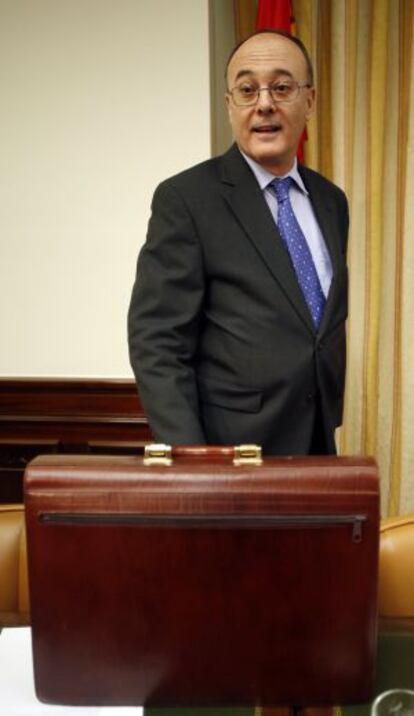New Bank of Spain chief criticizes his predecessors
Luis María Linde confirms that toxic financial assets will be deposited in a single “bad bank”

The new governor of the Bank of Spain, Luis María Linde, on Tuesday left the door open for unviable banks to be wound up as part of the restructuring of the sector, using funds of up to 100 billion euros to be granted by Spain’s European partners.
“In the event of it being decided that a bank is not viable, it will be wound up in an orderly fashion,” Linde said in his first appearance in Congress after being appointed in June.
However, Economy Minister Luis de Guindos later Tuesday said the government is not preparing to allow any bank to fold. A number of lenders have been taken under the wings of the government, including Bankia and its parent Banco Financiero y de Ahorro, Catalunya Banc, NCG Banco and Banco de Valencia, as a result of their exposure to the ailing real estate sector.
Independent consultants have initially estimated the capitalization needs of the banking sector at between 51 and 62 billion euros under an adverse economic scenario. The government is due to sign an agreement on a bailout for the banks later this month.
Linde said the toxic assets of the banks would be removed from their balance sheets and placed in a single so-called bad bank, ensuring the cost to the taxpayer in this exercise is kept to a minimum.
In his address, Linde was critical of the previous stewardship of the Bank of Spain in its failure to check the development of a property bubble and excessive levels of debt. “In the years of the property and financial bubble that ended in 2008 there was a type of euphoria, not only in Spain, but in all the countries in the European Union and the United States, which led to not seeing, or not wanting to see, the risks that were building up,” the governor said. “It was as if nobody wanted to forecast scenarios of recession, of interest-rate hikes or a collapse in funding.”
Linde also referred to the so-called anti-cyclical general provisions imposed on lenders by the Bank of Spain, which at the time were criticized by other countries and by Spanish banks themselves, amid claims it undermined their competitiveness. “From the perspective of today, a lot of people would agree that the main defect of this regulation was its timidity and insufficiency to contain the excessive growth in lending, and that we would all have been better off [...] if it had been made more demanding,” Linde said. “The Bank of Spain was considered then to be heterodox, but today we know it should have been even more heterodox in its use of its regulatory and supervisory capacity to reduce the vulnerability of the Spanish financial system,” the governor added.
The governor was also critical of the decision to allow savings banks to tie-up with each other through a “cold merger” arrangement, which contributed to delays in making necessary adjustments.
He also pointed to the failure of the stress tests carried out by the Bank of Spain in 2010 and 2011 under the auspices of the European Banking Authority (EBA) to identify the risk of a double-dip recession in Spain, which has turned out to be the case.
Tu suscripción se está usando en otro dispositivo
¿Quieres añadir otro usuario a tu suscripción?
Si continúas leyendo en este dispositivo, no se podrá leer en el otro.
FlechaTu suscripción se está usando en otro dispositivo y solo puedes acceder a EL PAÍS desde un dispositivo a la vez.
Si quieres compartir tu cuenta, cambia tu suscripción a la modalidad Premium, así podrás añadir otro usuario. Cada uno accederá con su propia cuenta de email, lo que os permitirá personalizar vuestra experiencia en EL PAÍS.
¿Tienes una suscripción de empresa? Accede aquí para contratar más cuentas.
En el caso de no saber quién está usando tu cuenta, te recomendamos cambiar tu contraseña aquí.
Si decides continuar compartiendo tu cuenta, este mensaje se mostrará en tu dispositivo y en el de la otra persona que está usando tu cuenta de forma indefinida, afectando a tu experiencia de lectura. Puedes consultar aquí los términos y condiciones de la suscripción digital.








































